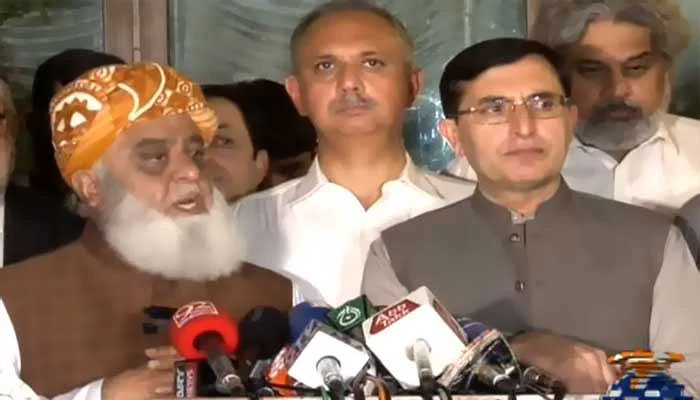PTI and its options
PTI's overtures to JUI-F have been marred by conflicting messages from its own leadership
The PTI appears to be navigating a turbulent phase, both domestically and internationally. From its failed attempts at forming a grand opposition alliance to its fraught relationship with the establishment, the party's political missteps seem to now have left it with fewer options than it may have originally thought it would have. One of the party's major political gambits was to cobble together an opposition front, ostensibly to challenge the current government. However, internal contradictions and a lack of political finesse have hindered progress. The party’s overtures to the Jamiat Ulema-e-Islam-Fazl (JUI-F) have been marred by conflicting messages from its own leadership. On the one hand, PTI leader Asad Qaiser has suggested that talks with the JUI-F are ongoing and that a national agenda will be announced upon Maulana Fazlur Rehman’s return from abroad. On the other hand, Chief Minister of Khyber Pakhtunkhwa Ali Amin Gandapur has taken a confrontational approach, openly criticising Maulana Fazl. Obviously, the JUI-F has not taken this too well, and questioned the PTI’s sincerity in forging alliances.
There is also the party's rhetoric about a historic fight for democracy and human rights, and how other leaders must join them or face condemnation from history. Unfortunately, you don't make friends by shaming others; that's practically Politics 101. Instead, politics is really the art of the possible -- built on compromise and diplomacy, not ultimatums and coercion. If the PTI expects the JUI-F or any other party to stand with it, it must demonstrate a willingness to engage in meaningful dialogue rather than resorting to dismissive language and confrontational posturing. Political observers have rightly noted that an opposition alliance without the JUI-F would be incomplete, given the party’s significant street power and ability to mobilise protests. Beyond the domestic political scene, the PTI’s strategic miscalculations extend to its fraught relationship with the establishment. A recent report in the media had also highlighted the frustration among PTI leaders engaged in backchannel talks due to an aggressive post from the party’s official account. This is the party's main challenge: its self-sabotaging tendencies -- probably brought on by the fact that there are way too many cooks in the PTI kitchen and almost all of them don't have all the ingredients at hand. While many senior PTI leaders disagree with the confrontational approach, they seem powerless to alter the party’s course. The establishment, for its part, has shown no interest in engaging. What with the PTI’s previous inability to sustain dialogue with the government, its current isolation appears largely self-inflicted.
The woes are not limited to domestic politics either. On the international front, the party’s hope that a Trump-led US administration would intervene in Imran Khan’s legal troubles has proven to be a miscalculation. The recent comments by US State Department spokesperson Tammy Bruce -- who carefully avoided responding to a question about Imran Khan’s imprisonment -- seem to suggest that the PTI’s expectations of international support are misplaced. With the establishment unresponsive, an opposition alliance in tatters, and no international support in sight, what options does the PTI have? Perhaps it is time for the party to reassess its strategy? A white flag raised and a genuine attempt at negotiations is not a terrible idea -- not just for the party but for a country that desperately needs an end to the political variety show that has been running the past few years non-stop.
-
 Factory Explosion In North China Leaves Eight Dead
Factory Explosion In North China Leaves Eight Dead -
 Blac Chyna Opens Up About Her Kids: ‘Disturb Their Inner Child'
Blac Chyna Opens Up About Her Kids: ‘Disturb Their Inner Child' -
 Winter Olympics 2026: Milan Protestors Rally Against The Games As Environmentally, Economically ‘unsustainable’
Winter Olympics 2026: Milan Protestors Rally Against The Games As Environmentally, Economically ‘unsustainable’ -
 How Long Is The Super Bowl? Average Game Time And Halftime Show Explained
How Long Is The Super Bowl? Average Game Time And Halftime Show Explained -
 Natasha Bure Makes Stunning Confession About Her Marriage To Bradley Steven Perry
Natasha Bure Makes Stunning Confession About Her Marriage To Bradley Steven Perry -
 ChatGPT Caricature Prompts Are Going Viral. Here’s List You Must Try
ChatGPT Caricature Prompts Are Going Viral. Here’s List You Must Try -
 James Pearce Jr. Arrested In Florida After Alleged Domestic Dispute, Falcons Respond
James Pearce Jr. Arrested In Florida After Alleged Domestic Dispute, Falcons Respond -
 Cavaliers Vs Kings: James Harden Shines Late In Cleveland Debut Win
Cavaliers Vs Kings: James Harden Shines Late In Cleveland Debut Win -
 2026 Winter Olympics Snowboarding: Su Yiming Wins Bronze And Completes Medal Set
2026 Winter Olympics Snowboarding: Su Yiming Wins Bronze And Completes Medal Set -
 Trump Hosts Honduran President Nasry Asfura At Mar-a-Lago To Discuss Trade, Security
Trump Hosts Honduran President Nasry Asfura At Mar-a-Lago To Discuss Trade, Security -
 Cuba-Canada Travel Advisory Raises Concerns As Visitor Numbers Decline
Cuba-Canada Travel Advisory Raises Concerns As Visitor Numbers Decline -
 Anthropic Buys 'Super Bowl' Ads To Slam OpenAI’s ChatGPT Ad Strategy
Anthropic Buys 'Super Bowl' Ads To Slam OpenAI’s ChatGPT Ad Strategy -
 Prevent Cancer With These Simple Lifestyle Changes
Prevent Cancer With These Simple Lifestyle Changes -
 Air Canada Flight Diverted St John's With 368 Passengers After Onboard Incident
Air Canada Flight Diverted St John's With 368 Passengers After Onboard Incident -
 Experts Reveal Keto Diet As Key To Treating Depression
Experts Reveal Keto Diet As Key To Treating Depression -
 Inter Miami Vs Barcelona SC Recap As Messi Shines With Goal And Assist
Inter Miami Vs Barcelona SC Recap As Messi Shines With Goal And Assist




